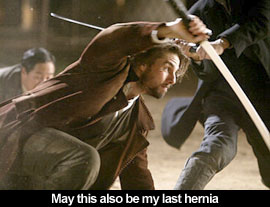THE LAST SAMURAI
**½/****
starring Tom Cruise, Billy Connolly, Tony Goldwyn, Shin Koyamada
screenplay by John Logan and Marshall Herskovitz & Edward Zwick
directed by Edward Zwick
Une hirondelle a fait le printemps
***/****
starring Michel Serrault, Mathilde Seigner, Jean-Paul Roussillon, Frédéric Pierrot
screenplay by Christian Carion and Eric Assous
directed by Christian Carion
 by Walter Chaw Concerned with the encroachment of technology, spawned by the humanism of the French Revolution, Romanticism as a movement in poetry is involved in nostalgia for an idealized Natural history. On film, it occasionally manifests itself in period pieces that focus on the encroachment and proliferation of the railroad: its engines (as in King Vidor’s Duel in the Sun and Beyond the Forest, or the Hughes Brothers’ From Hell) the manifestation of the industrial revolution in terms of hellmouths and serpents–William Blake’s “Tyger” burning bright in the forests of a primordial night, all-consuming and inexorable. That loss of ritual to the march of time, tradition and heritage falling before the metal chimera of technology finds itself articulated in two very different films: Edward Zwick’s curious, derivative, workmanlike The Last Samurai, and Christian Carion’s bleak and affecting The Girl from Paris (Une hirondelle a fait le printemps).
by Walter Chaw Concerned with the encroachment of technology, spawned by the humanism of the French Revolution, Romanticism as a movement in poetry is involved in nostalgia for an idealized Natural history. On film, it occasionally manifests itself in period pieces that focus on the encroachment and proliferation of the railroad: its engines (as in King Vidor’s Duel in the Sun and Beyond the Forest, or the Hughes Brothers’ From Hell) the manifestation of the industrial revolution in terms of hellmouths and serpents–William Blake’s “Tyger” burning bright in the forests of a primordial night, all-consuming and inexorable. That loss of ritual to the march of time, tradition and heritage falling before the metal chimera of technology finds itself articulated in two very different films: Edward Zwick’s curious, derivative, workmanlike The Last Samurai, and Christian Carion’s bleak and affecting The Girl from Paris (Une hirondelle a fait le printemps).

 by Walter Chaw
by Walter Chaw by Walter Chaw
by Walter Chaw